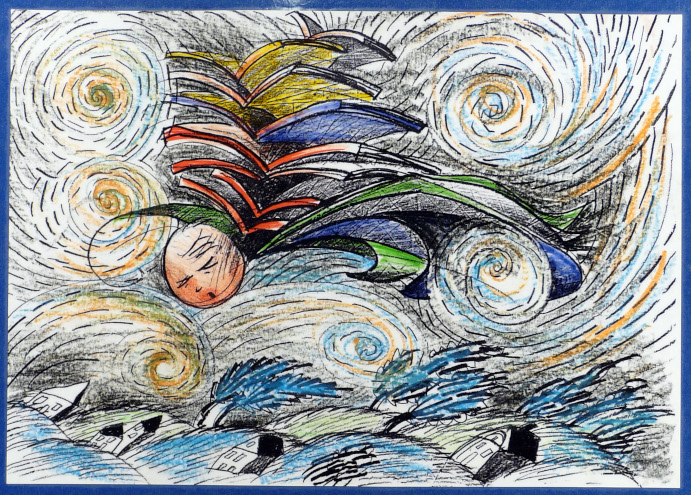Invaluable Understanding

Drawing: Flying away, against all odds by François Jomini, 1988 © François Jomini, ATD Fourth World.
ATD Fourth World Proposals to Policymakers
Presentation by Bruno Dabout, Director General ATD Fourth World at UNESCO in Paris, October 17, 2023.
In December 1980, Joseph Wresinski spoke with academics at UNESCO and later in other forums. He questioned them about the knowledge needed by people in poverty, grassroots workers, and our national and international communities in order to effectively oppose poverty and exclusion. Academic knowledge is incomplete and people in all fields need to build their knowledge and enrich it in collaboration with others.
People in situations of extreme poverty have accumulated invaluable experience as they struggle to survive and they have the capacity to reflect on their experience.
How can we promote recognition of people in poverty’s knowledge and their capacity to become partners?
Forty years after the challenge issued by Joseph Wresinski, concepts of multiple types of knowledge seem to have been accepted, as well as concepts of participation and partnership as drivers of development policies and the work to end poverty.
In 2018, Amina J. Mohammed, Deputy Secretary-General of the United Nations, declared1 that the success of sustainable development goals aiming to eradicate poverty everywhere and in all its forms by 2030 will depend on implementing them through multi-sectoral collaboration and aligning them with our political systems. Their success will be measured by the extent to which we fullfill our commitment to leave no one behind.
In 2019, Ángel Gurría, then Secretary-General of the Organisation for Economic Co-operation and Development, recognised the validity of research in which academics and people in situations of poverty collaborate. Gurría also recognised the importance of the results of the research on the hidden dimensions of poverty carried out by ATD Fourth World and Oxford University. This research reveals little-explored dimensions such as stigmatisation, discrimination, and marginalisation of people in situations of poverty, their disempowerment, and their unrecognised contributions.
What about the implementation of these declarations?
In 2000, the World Bank study “Voices of the Poor” marked a turning point in academic and political circles for the recognition of the value of participatory research. This large participatory study involved interviewing 40,000 people in fifty countries. One of the components has a significant title: “Can Anyone Hear Us?” But it was still an “extractive” approach to building knowledge, where people were asked to share their stories but not their thoughts.
International institutions have evolved to fund projects with enormous budgets (up to 150 billion dollars) for community development initiatives with “participatory systems” that identify beneficiaries, and evaluate and adjust current projects. Despite such investments, it is not possible to distinguish between purely consultative participation and deliberative participation. The importance of deliberative participation is not recognised.
Esther Duflo and Abhijit Banerjee, 2019 recipients of the Nobel Prize in Economics, address the tendency of economic experts to decide for people living in poverty instead of consulting them. Their work on randomised evaluations allows for data-based analysis of the results of action programmes. But the question remains: How do we enable people in situations of poverty to contribute their knowledge? How do we obtain the participation of people who struggle every day to survive?
To open up possibilities for transforming society and moving towards the eradication of poverty, at least in its most severe forms, we must promote and achieve meaningful participation. Following are four proposals to that end:
- Establish the fundamental distinction between purely consultative participation and deliberative participation: We should recognise the difficulties that this involves. Special attention needs to be paid to different forms of epistemic injustice; for example, people in poverty not being believed or having their testimony analysed by others without being able to give their own analysis.
- Support organisations that show long-term solidarity with people in extreme poverty: Academics cannot assume that they can jump in and engage with individuals living in extreme poverty. We need organisations that offer spaces to talk freely, spaces without social control so that the most excluded people in marginalised communities can dare to speak and have their words heard and respected. We need organisations that practise this type of approach and that have been present over the long term with populations experiencing poverty. It should be emphasised that this requires funding for action programmes that aim for results in ten years rather than three years.
- Open up and promote spaces for meetings, dialogue, and reflection among the people involved: This needs academics and policymakers to be ready to invest much more time than they would for consultations among their peers. As well as time, they need to consider the conditions necessary to improve equality among participants, to build trust, and to guarantee the effective participation of all individuals and groups. Time and money are also needed for tasks such as translating and interpreting in several languages.
- Raise awareness and adopt the Instrument for the Deliberative Elaboration and Evaluation of Programmes and Policies (IDEEP): The IDEEP aims to inform policymakers, funders, and organisations that want to put into practice the ideal of participation in planning follow-up and evaluation of public policies, projects, and development programmes. It proposes a deliberative methodology that goes beyond participation. This tool, conceived in a partnership between ATD Fourth World and the United Nations Special Rapporteur on extreme poverty and human rights, will be available starting February 2024.
In conclusion, a very short story:
“Let people who know teach people who do not know,” was written in large letters on a wall in ATD Fourth World’s courtyard in Ouagadougou, the capital of Burkina Faso. One day, during a workshop on education involving parents in poverty, young people who had lived on the streets, teachers, political representatives, and academics, the participants carved a new motto in wood and hung it close to the original one; it did not replace the original, but supplemented it:
“Let people who think they don’t know, teach people who think they do.”

